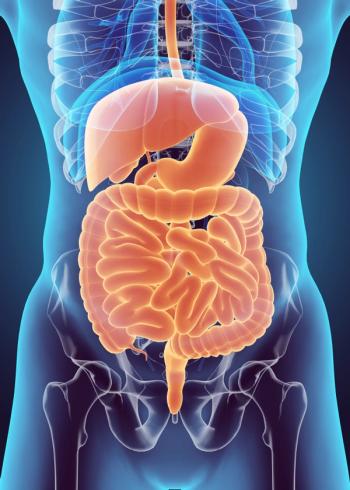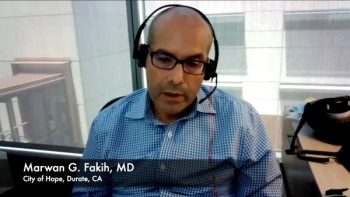
Colorectal Cancer
Latest News

Latest Videos

CME Content
More News

Investigators discuss the use of targeted therapies to treat metastatic colorectal cancer.

Drs Liliana Bustamante and Richard Kim explore conclusions highlighted by a paper on postoperative MRD analysis as a strong prognostic biomarker in colorectal cancer.

Patients with colorectal liver metastases who were treated with transarterial Yttrium-90 radioembolization plus second-line chemotherapy experienced a long-term survival benefit.

Drs Liliana Bustamante and Richard Kim review “Detection of Molecular Residual Disease Using Personalized Circulating Tumor DNA Assay in Patients With Colorectal Cancer Undergoing Resection of Metastases,” by Loupakis F, et al.

Investigators believe that active monitoring presents an alternative option to capecitabine maintenance therapy for patients with stable or responding metastatic colorectal cancer.

The FDA has expanded the label for cetuximab/encorafenib for the treatment of patients with previously treated BRAF V600E–positive metastatic colorectal cancer.

An association was seen between baseline HER2 expression levels and the antitumor activity of fam-trastuzumab deruxtecan-nxki for patients with HER2-positive, metastatic colorectal cancer.

Takayuki Yoshino, MD, PhD provides perspective on key issues surrounding therapy selection in gastrointestinal cancers.

Adavosertib demonstrated a 65% risk reduction in disease progression and death for patients with TP53-/RAS-mutant metastatic colorectal cancer following first-line chemotherapy.

Data from the KRYSTAL-1 trial show promise of adagrasib as monotherapy and in combination with other standard agents for colorectal cancer.

Patients with colorectal cancer could benefit from the COLMATE platform as it allows for opportunities in clinical trial enrollment.

The use of onvansertib in combination with standard-of-care chemotherapy had an increase in the objective response rate and progression-free survival during the phase 1b/2 trial for metastatic colorectal cancer.

The combination of standard chemoradiotherapy plus avelumab demonstrated clinical activity while maintaining a tolerable safety profile for patients with locally advanced rectal cancer.

The phase 2 CAVE trial indicated that a combination of cetuximab and avelumab is a promising rechallenge treatment for patients with RAS wild-type metastatic colorectal cancer.

This article reviews MRD and decision-making in early-stage colorectal cancer and includes insights from Christopher Lieu, MD, of the University of Colorado School of Medicine in Denver, and Daniel Ahn, DO, of the Mayo Clinic in Phoenix, AZ.

New findings indicate that an increased intake of vitamin D may help to prevent the development of early-onset colorectal cancer in individuals under the age of 50.

United States Military Health System beneficiaries with colon cancer are more likely to have improved survival outcomes vs the general population, with a particularly notable benefit in Black patients.

Although pembrolizumab added to chemoradiotherapy was well tolerated in patients with stage II/III locally advanced rectal cancer, the neoadjuvant rectal score vs FOLFOX/chemoradiotherapy suggest that further study into its utility in this setting may not be supported.

Personalized risk assessments that utilize pathogenic variations can help detect CRC early in patients with Lynch Syndrome.

Data from a first-of-its-kind study indicated that unnecessary use of antibiotics may lead to early-onset colon cancer.

Findings from the OCTOPUS Consortium of trial data indicated that weight-based chemotherapy dosing may improve outcomes for obese patients with colorectal cancer.

More elderly, frail patients with colorectal cancer were able to complete adjuvant chemotherapy following geriatric intervention.

CancerNetwork® sat down with Marwan G. Fakih, MD, of City of Hope at the 2021 ASCO Annual Meeting to talk about a potential multidisciplinary treatment approach to colorectal cancer with regorafenib/nivolumab.

NRG-GI004/SWOG-S1610: Colorectal Cancer Metastatic dMMR/MSI-H Immunotherapy (COMMIT) Study: A Randomized Phase 3 Study of mFOLFOX6/Bevacizumab/Atezolizumab Combination vs Single Agent Atezolizumab in the First-Line Treatment of Patients With Deficient DNA Mismatch Repair (dMMR)/Microsatellite Instability–High (MSI-H) Metastatic Colorectal Cancer (NCT02997228).

Individuals with an early-onset colorectal cancer diagnosis had a survival benefit versus those at later ages, especially for patients younger than 50 years old.










































